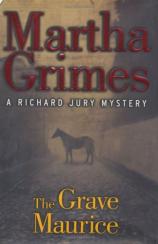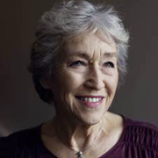Excerpt
Excerpt
The Grave Maurice

Prologue
In the distance, the horse looked white, but nearer, one could see
the white was muted, more the color of a winter dawn, a shadowy
white, like blue snow. It was barely dawn, the boy's favorite time
of day. He loved all the horses in the stable but this horse in
particular.
The pale horse watched the boy coming toward him, bridle and saddle
over his arm, walking through the mist. Not him. What had
happened to that jockey who could really ride him? Where were the
ribbons, the roses, the shouts and the cheers? Or that girl, for
that matter, who handled him better than the boy, her fingers
curled on the reins like crysthanthemum petals. If there was one
thing the horse knew it was hands-the boy's the trainer's the
jockey's the girl's. She must be a filly in disguise; she couldn't
be a human girl. For some reason.
The boy came up to him, patted and smoothed his neck, and handed
over a couple of lumps of sugar. Then he threw the plaid blanket
over him and they both walked off on the path through the trees,
across the pasture, toward the track. The boy still carried the
saddle, not wanting to mount until they'd reached the track, which
lay at the bottom of a low-rising hill. This early-morning gallop
around the stud farm's training track was the high point of their
day.
Your day.
The boy and the horse were only a couple of years apart-sixteen and
eighteen-but the horse (the boy knew) was infinitely more talented,
even though its racing days were past. Though he knew it wouldn't
happen, the boy hoped the horse would outlive him. The horse had
outlived his father, who had been killed during a race, thrown from
another horse. When he thought about his father, the boy found it
hard to picture him in anything except his blue and gold silks. His
father had been famous. But this horse, Samarkand, was
fabled.
The boy, whose name was Maurice, often wondered if Samarkand missed
the race, the hectic thrashing of hooves, the cries and cheers of a
summer afternoon, the excitement of the winner's circle.
He remembered vividly a day when he was small, his dad up on
Samarkand, winning the Gold Cup at Ascot. He saw himself and his
little cousin Nell jumping up and down for joy like two corks
popped from champagne bottles. The year before it had been
Newmarket and the first time that Samarkand had astonished them
all. In the backstretch the horse had opened up. Already running
hard, Samarkand had run harder, leaving the entire field seventeen
furlongs behind in his smoke.
His father's surprise at this totally unexpected show had wiped his
face clean of expression, even when they all got into the winner's
circle. The stud farm's owner-Maurice's grandfather-could find
nothing to say. The trainer was the only one who seemed to take it
in stride, as if he expected nothing less of Samarkand, but took no
credit for himself when people slapped him on the back and said
Brilliant, brilliant. People reached up to grab the jockey's hand
as wreaths of flowers descended on horse and jockey as if they'd
fallen from the sky.
The one in the circle who was least vainglorious and most dignified
was Samarkand himself.
Samarkand wasn't just a horse; he was one of the greatest horses in
horse history, was mentioned in the same breath as Red Rum or that
American horse known for being a weight carrier, for winning no
matter how much they piled it on-Forego.
Forget it.
Samarkand had run every high-stakes race there was, won nearly
every significant purse. Not just in his own country, but in
America, Churchill Down, New York, the Derby, the Belmont and that
beautiful Hialeah Park.
Maurice often wondered about Thoroughbreds. Did things get
imprinted on their minds? Events, races, the winner's circle? This
was not to wonder if Samarkand simply remembered the day-to-day
rounds, but were important things printed, branded on his mind?
Images of happiness, images of hay? Memories of Newcastle or New
York, Doncaster, Cheltenham, Hialeah, the colors, the silks, the
roses?
...the pink wading birds, the brilliant suns and colors rushing
towar him, partly hidden from his blinkered eye, a whole vista of
colors and faces, cheers and shouting. Forced to the rail (he hated
that) he waited for an opening and when it came, he blew straight
through it.
Freedom. Nothing ahead nothing beside. Even the cheers faded before
they reached his ears.
Right now, they were doing a five-furlong breeze and
Maurice knew Samarkand could do it in little over a minute; he'd
done it before.
When they were coming out of the backstretch, Maurice noticed a
figure with binoculars standing on the hill. It wouldn't be their
trainer; he didn't come this early. It must be Roger. His uncle,
Roger, sometimes came here to watch before he left for the hospital
in London.
Not Roger. Wrong hands.
Samarkand did not appear to feel the loss of his old
agility, his old gait, nor the loss of the nimble orchestration of
his jockey's hands and legs. The horse seemed as willing, if he'd
been given rein, to pull out all the stops for this
sixteen-year-old, too-tall lad as for the boy's father. They
galloped round the track at no record-breaking speed. It didn't
matter.
In memory, they flew.
Excerpted from THE GRAVE MAURICE © Copyright 2002 by
Martha Grimes. Reprinted with permission by Viking Press. All
rights reserved.




